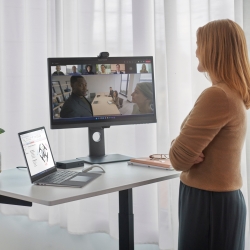April 8, 2022
Research casts doubt on environmental benefits of hybrid working
 A permanent post-pandemic switch to hybrid working may do little to reduce carbon emissions as the majority of remote workers travel further each week than their office-based counterparts, new research from the University of Sussex Business School reveals. The newly published study finds that, prior to the pandemic, most remote workers in England travelled further each week than office-based workers – despite taking fewer trips. This was partly because remote workers tended to live further from their workplace than non-teleworkers, so had longer, if less frequent, commutes. In addition, remote workers engaged in more travel on the days when they worked from home – for example, by making extra trips to shops and cafes. (more…)
A permanent post-pandemic switch to hybrid working may do little to reduce carbon emissions as the majority of remote workers travel further each week than their office-based counterparts, new research from the University of Sussex Business School reveals. The newly published study finds that, prior to the pandemic, most remote workers in England travelled further each week than office-based workers – despite taking fewer trips. This was partly because remote workers tended to live further from their workplace than non-teleworkers, so had longer, if less frequent, commutes. In addition, remote workers engaged in more travel on the days when they worked from home – for example, by making extra trips to shops and cafes. (more…)







 The first Omnirama event on the 23rd of March launched the series exploring different factors challenging the world of work in a time of prevailing uncertainty. Underlying Ominirama’s raison d’etre is that recent events have turned the status quo on its head with some major structural and systemic changes taking place. Nobody seems to have any clear idea of how to deal with this enormous transformation in the ways we work All the playbooks and all the guidance that we have all relied upon for so many years have now gone out the window.
The first Omnirama event on the 23rd of March launched the series exploring different factors challenging the world of work in a time of prevailing uncertainty. Underlying Ominirama’s raison d’etre is that recent events have turned the status quo on its head with some major structural and systemic changes taking place. Nobody seems to have any clear idea of how to deal with this enormous transformation in the ways we work All the playbooks and all the guidance that we have all relied upon for so many years have now gone out the window. 


 Even as we begin to glimpse the light at the end of the tunnel of the pandemic, evidence suggests that many workers want to carry over the working flexibility that the pandemic afforded into the post-pandemic world and a new future of work. Namely, employees are wanting to adopt a ‘mixed’ working style – spending time both working in the workplace,
Even as we begin to glimpse the light at the end of the tunnel of the pandemic, evidence suggests that many workers want to carry over the working flexibility that the pandemic afforded into the post-pandemic world and a new future of work. Namely, employees are wanting to adopt a ‘mixed’ working style – spending time both working in the workplace, 










 An employee survey can offer fantastic insight into the highs and lows of working for your company, and how employees perceive and understand your business culture. These survey responses can allow mangers and leaders to make proactive and positive changes to the business, improve employee engagement and ultimately increase business success. However, research tells us response rates can be as low as
An employee survey can offer fantastic insight into the highs and lows of working for your company, and how employees perceive and understand your business culture. These survey responses can allow mangers and leaders to make proactive and positive changes to the business, improve employee engagement and ultimately increase business success. However, research tells us response rates can be as low as 









April 10, 2022
Facilities Managers should be seen as stewards of corporate culture
by Pierre Guelen • Comment, Facilities management